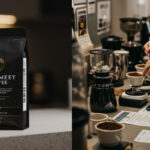
What Makes Coffee Traditional vs Modern? A Timeless Comparison
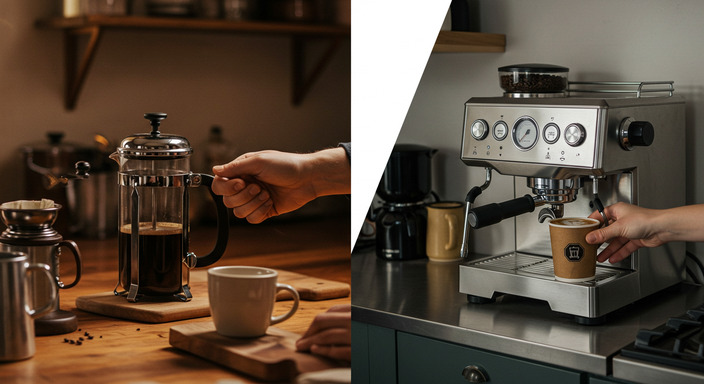
Table of Contents
ToggleThe Heart of Traditional Coffee
A Tribute to Simplicity and Nostalgia
Traditional coffee is more than just a beverage; it’s a ritual, a moment of pause in the rush of daily life. There’s something profoundly comforting about the aroma of freshly brewed coffee filling the kitchen, the sound of a percolator gurgling on the stove, or the sight of steam rising from a humble mug. It’s a reminder of simpler times, when life moved at a slower pace and coffee was less about trends and more about connection. Whether it’s the first sip of a morning brew or the warmth of a shared cup with loved ones, traditional coffee evokes a sense of nostalgia that transcends generations.
The Cultural Roots of Traditional Brewing Methods
Traditional coffee brewing methods are deeply intertwined with cultural heritage. From the Italian moka pot to the French press, these methods have been passed down through generations, each carrying with it a unique story. In many cultures, coffee is a cornerstone of social interaction, a symbol of hospitality and community. For example:
- In Ethiopia, the birthplace of coffee, the ceremonial brewing process is a sacred tradition that brings people together.
- In Turkey, coffee is prepared in a cezve and served with a side of conversation and sweets.
- In the American South, the slow drip of a percolator is often associated with family gatherings and Sunday mornings.
These methods are more than just ways to make coffee—they are a celebration of culture and history.
How Traditional Coffee Connects Us to the Past
Traditional coffee is a bridge to the past, a way to honor the traditions of those who came before us. When we brew coffee using time-honored methods, we’re not just making a drink—we’re participating in a legacy. It’s a way to feel connected to our ancestors, to understand the craftsmanship and care that went into their daily lives. The tools of traditional coffee—whether it’s a hand-cranked grinder or a cast-iron coffee pot—tell stories of resilience, ingenuity, and a deep appreciation for the simple pleasures in life. By embracing these methods, we keep those stories alive and ensure that the rich heritage of coffee continues to inspire future generations.
Modern Coffee: Innovation and Experimentation
The Rise of Specialty Coffee and Advanced Brewing Techniques
In recent years, the coffee landscape has undergone a remarkable transformation, driven by the rise of specialty coffee. This movement emphasizes quality, sustainability, and craftsmanship, elevating coffee from a simple beverage to an art form. Gone are the days of bland, mass-produced brews; today’s coffee enthusiasts seek out single-origin beans, small-batch roasts, and meticulously crafted cups. Advanced brewing techniques, such as pour-over, cold brew, and AeroPress, have further expanded the possibilities, allowing coffee lovers to explore nuanced flavors and aromas that were once reserved for the most discerning palates.
How Technology Has Transformed the Coffee Experience
Technology has played a pivotal role in shaping the modern coffee experience. From smart coffee makers that allow for precise temperature control to apps that guide home baristas through the perfect brew, innovation has made it easier than ever to enjoy a café-quality cup at home. Even the humble espresso machine has seen upgrades, with high-tech models offering programmable settings and built-in grinders. Technology has not only improved convenience but also democratized the artistry of coffee-making, empowering everyone to experiment and refine their craft.
The Influence of Global Coffee Trends on Modern Tastes
As the world grows more connected, global coffee trends have begun to influence tastes and preferences across the United States. Scandinavian light roasts, Japanese siphon brewing, and Australian flat whites have all found their way into American coffee shops and home kitchens. These international influences have broadened our understanding of what coffee can be, inspiring a new appreciation for diverse traditions and methods. Whether it’s a meticulously crafted latte or a bold Turkish coffee, these global trends remind us that coffee is a truly universal language, capable of bridging cultures and sparking creativity.
Brewing Methods: Then and Now
Traditional Methods: A Nod to Simplicity
For generations, the art of brewing coffee has been a ritual steeped in tradition. The drip coffee maker, a staple in American households, offers a straightforward, no-fuss way to start the day. Its familiar gurgle and aroma evoke memories of family breakfasts and lazy Sunday mornings. The percolator, with its rhythmic bubbling, brings a sense of nostalgia, often associated with camping trips or grandmother’s kitchen. And then there’s the French press, a method that celebrates patience and craftsmanship, delivering a rich, full-bodied cup that feels like a warm embrace.
Modern Methods: Innovation Meets Precision
As coffee culture evolved, so did the methods of brewing. The espresso machine revolutionized the way we experience coffee, offering concentrated shots that form the foundation of lattes, cappuccinos, and more. The pour-over technique, with its meticulous process, has become a favorite among coffee enthusiasts, highlighting the subtle nuances of each bean. And then there’s cold brew, a modern marvel that transforms coffee into a smooth, refreshing drink, perfect for hot summer days.
How Brewing Techniques Shape Flavor and Experience
Each brewing method tells a story, shaping not just the flavor but the entire coffee experience. Traditional methods like the drip or percolator often produce a familiar, comforting taste, while the French press emphasizes boldness and texture. Modern techniques, on the other hand, allow for greater control and experimentation. Espresso machines extract intense flavors, pour-over highlights delicate notes, and cold brew offers a mellow, low-acid alternative. The method you choose can transform your cup into a journey—whether it’s a trip down memory lane or an exploration of new horizons.
The Role of Coffee in Daily Routines
Traditional Coffee as a Comforting Daily Ritual
For generations, traditional coffee has been more than just a beverage—it’s a comforting ritual that anchors the day. Whether it’s the aroma of freshly brewed coffee wafting through a quiet morning kitchen or the familiar clink of a spoon stirring sugar into a steaming cup, these moments are steeped in nostalgia. Traditional coffee, often brewed in a simple drip machine or percolator, is a reminder of simpler times. It’s the kind of coffee that fuels conversations at family breakfasts, accompanies a good book on a rainy afternoon, or provides a warm embrace on a chilly day. Its timeless appeal lies in its ability to connect us to our roots and offer a sense of continuity in an ever-changing world.
Modern Coffee as a Lifestyle Statement
In contrast, modern coffee has evolved into a lifestyle statement, reflecting individuality and sophistication. From artisanal pour-overs to Instagram-worthy latte art, coffee has become a canvas for creativity and self-expression. For many, it’s not just about the caffeine—it’s about the experience. Visiting a trendy coffee shop, sipping a meticulously crafted cold brew, or experimenting with exotic beans has become a way to showcase personal taste and embrace contemporary culture. Modern coffee is fast-paced, innovative, and often tied to urban living, yet it still holds the power to pause the chaos of daily life, even if just for a moment.
How Both Forms of Coffee Bring People Together
Whether traditional or modern, coffee has an unparalleled ability to bring people together. Traditional coffee fosters connection through shared rituals—think of the way a pot of coffee is always ready for guests or how it’s the centerpiece of family gatherings. Modern coffee, on the other hand, creates community in new ways, from coffee shop meetups to online forums discussing the latest brewing techniques. Both forms of coffee serve as a universal language, bridging generations and cultures. As the saying goes, “Coffee is a way of stealing time that should by rights belong to your older self.” Whether it’s a simple cup of black coffee or a meticulously crafted espresso, the act of sharing a cup is a celebration of connection and togetherness.
Flavor Profiles: Old vs. New
The Bold, Straightforward Taste of Traditional Coffee
Traditional coffee is a testament to simplicity and reliability. Its flavor is bold, robust, and unapologetically straightforward—qualities that have made it a cornerstone of morning routines for generations. Whether it’s the earthy depth of a French press brew or the familiar richness of a classic drip coffee, traditional coffee speaks to those who crave a comforting, no-frills experience. Its taste is often anchored in darker roasts, with notes of chocolate, nuts, and caramel that evoke a sense of warmth and nostalgia.
The Nuanced, Complex Flavors of Modern Brews
Modern coffee, on the other hand, is a playground of complexity and innovation. Brewed with precision and artistry, it often highlights the unique characteristics of single-origin beans or experimental processing methods. Flavors can range from bright and fruity to floral and tangy, with a focus on subtleties that challenge the palate. Techniques like pour-over, cold brew, and siphon brewing have unlocked entirely new dimensions of taste, appealing to those who seek adventure in every cup. Modern coffee is less about the routine and more about the journey of discovery.
How Personal Preferences Bridge the Gap Between the Two
What’s fascinating is how personal preferences bring these two worlds together. For some, a strong, traditional brew is a non-negotiable start to the day, a ritual that grounds them in familiarity. For others, the allure of modern coffee lies in its ability to surprise and delight with every sip. Yet, many coffee lovers find themselves oscillating between the two, appreciating the boldness of tradition one day and the complexity of modernity the next. It’s this flexibility that makes coffee such a versatile and deeply personal experience.
Sustainability and Ethical Considerations
As we reflect on the journey of coffee—from its humble origins to its modern-day incarnations—it’s impossible to ignore the growing importance of sustainability and ethical practices in shaping its future. Both traditional and modern coffee have unique roles to play in fostering a more responsible and thoughtful coffee culture.
Traditional Coffee: Simplicity and Minimal Waste
Traditional coffee, with its roots in simplicity, has always been a testament to resourcefulness. Think of the classic brewing methods: a French press, a stovetop Moka pot, or even a simple pour-over. These methods often require no electricity, minimal equipment, and produce little waste. The focus was on the coffee itself—pure, unadulterated, and enjoyed in its most natural form. This approach not only connects us to the past but also serves as a gentle reminder of the beauty of minimalism in a world often overwhelmed by excess.
Modern Coffee: Embracing Eco-Friendly and Fair-Trade Practices
Modern coffee culture, on the other hand, has embraced innovation with a conscience. From compostable coffee pods to reusable cups, the industry is making strides in reducing its environmental footprint. Fair-trade practices have also gained momentum, ensuring that coffee farmers are paid fairly for their labor. These efforts reflect a growing awareness of the interconnectedness of our choices and their impact on people and the planet. While modern methods may involve more complexity, they bring with them a commitment to doing better.
Balancing Tradition and Innovation for a Better Coffee Future
The key to a sustainable coffee future lies in finding harmony between tradition and innovation. By honoring the simplicity of traditional methods, we can reduce waste and reconnect with coffee’s cultural roots. At the same time, embracing modern eco-friendly and ethical practices ensures that coffee production remains viable and fair for generations to come. It’s about preserving the essence of what makes coffee special while adapting to the needs of a changing world.
As coffee lovers, we have the power to shape this future with every cup we brew. Whether you prefer the nostalgic charm of a diner-style drip or the precision of a modern espresso machine, your choices matter. Together, we can celebrate coffee’s timeless appeal while contributing to a more sustainable and equitable coffee culture.
FAQs: Sustainability and Ethical Coffee
- Q: How can I make my coffee routine more sustainable?
A: Opt for reusable filters, compost your coffee grounds, and choose brands that prioritize fair-trade and eco-friendly practices. - Q: Does traditional coffee have a lower environmental impact?
A: Generally, traditional methods like French press or pour-over require fewer resources and produce less waste compared to single-use pods or machines. - Q: What does “fair-trade” mean in coffee?
A: Fair-trade ensures that coffee farmers receive fair wages and work under ethical conditions, promoting sustainability and social equity.
is an editor at Coffee With Finance and a true coffee enthusiast. He explores roasts, flavors, origins, and brewing methods, sharing stories that captivate both beginners and experts. Petter believes great coffee sparks meaningful moments—and that includes simple, jargon-free talks about personal finance. His content blends aroma, flavor, and insight, making each coffee break an inspiring and enriching experience.


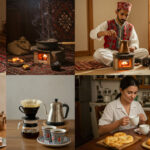










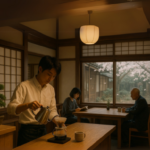




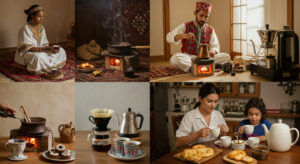



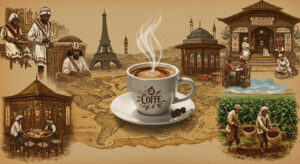

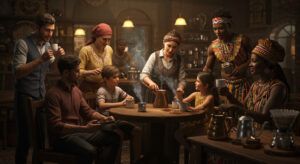


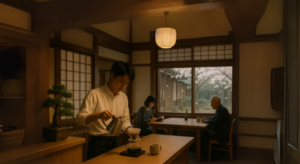
Post Comment